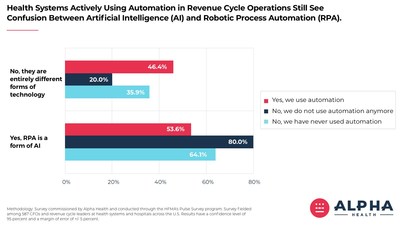Confusion Between Artificial Intelligence (AI) and Robotic Process Automation (RPA) High Among Healthcare Leaders

SOUTH SAN FRANCISCO, Calif., Dec. 10, 2020 /PRNewswire/ — Alpha Health, the first Unified Automation™ company for revenue cycle management in healthcare, released results of a national survey designed to assess adoption of automation in revenue cycle operations at health systems and hospitals across the U.S. According to the survey, 58.8 percent of health systems and hospital financial leaders mistakenly consider robotic process automation (RPA) to be a form of artificial intelligence (AI).
The survey was commissioned by Alpha Health and conducted through the Healthcare Financial Management Association’s (HFMA) Pulse Survey program. The survey was fielded between May 19, 2020 and June 22, 2020 among 587 chief financial officers and revenue cycle leaders at health systems across the United States. The survey has a confidence level of 95 percent with a margin of error of plus or minus 5 percent.
Aggressive marketing language can often drive a lack of clarity around technical concepts. Somewhat surprising, is that confusion between RPA and AI is high even among organizations that have automation in place and have likely gone through the diligence and/or request for proposal (RFP) process to select their automation solution. More than 50 percent of CFOs and revenue cycle leaders in organizations that are actively using automation say they consider RPA to be a form of artificial intelligence.
“RPA based bots can be good tools for automating simple, discrete, and static tasks,” said Varun Ganapathi, co-founder and Chief Technology Officer at Alpha Health. “AI and machine learning based technologies are capable of automating much more complex tasks that require some degree of judgment or subject matter expertise. Additionally, AI and machine learning based solutions can have the ability to navigate changes or new variables without the need to reprogram or recode a bot every time something changes.”
According to the 2020 Forrester(R) Ten Golden Rules for RPA Success report, vendor messaging often conflates AI and RPA, though they are distinct and coevolving technologies; RPA is deterministic while AI is probabilistic. The same report points out that while RPA is a valuable tool for some, scale is difficult, with fewer than 10 bots employed in more than half of all RPA programs worldwide. According to the report, finding enough tasks to automate is the biggest scale issue, as there is too much variation, even when outcomes are the same, and RPA does not handle those variations well.
“Revenue cycle management is a particularly dynamic and complex part of our healthcare system,” said Malinka Walaliyadde, co-founder and CEO of Alpha Health. “While most revenue cycle leaders don’t need to know detailed technical aspects of automation solutions, understanding the differences between the underlying technologies is critical to ensure they meet their needs in both the near and long term. Revenue Cycle Automation solutions with continuous learning capabilities offer provider organizations the best opportunities for immediate results as well as long-term value. Solutions that effectively handle change can scale over time with the needs of the organization while keeping maintenance costs minimal.”
Survey respondents were asked, “Do you consider RPA, as a technology, to be a form of AI?”
|
No, they are entirely different forms of technology |
41.2% |
|
Yes, RPA is a form of AI |
58.8% |
When statistically evaluated by past or current use of any revenue cycle automation tools, more than 50 percent of revenue cycle leaders in organizations that are actively using automation in their revenue cycle operations demonstrate confusion between RPA and AI.
|
No, they are entirely |
Yes, RPA is a form of AI |
|
|
Yes, we use automation |
46.4% |
53.6% |
|
No, we do not use automation anymore |
20.0% |
80.0% |
|
No, we have never used automation |
35.9% |
64.1% |
About Alpha Health
At Alpha Health we believe every dollar spent on healthcare matters because healthcare matters to everyone. The first Unified Automation™ company for healthcare, Alpha Health uses the same machine learning approaches that made driverless cars possible to provide health systems with a single solution for healthcare revenue cycle management. Alpha Health’s proprietary Unified Automation™ technology operates within a healthcare system’s existing electronic health record and revenue cycle infrastructure. Alpha Health’s Unified Automation™ brings together the best of people, data and technology to efficiently, accurately and autonomously navigate the complex state of medical reimbursement in the United States. This enables health systems to reduce their cost of care and be better stewards of the healthcare dollar. Alpha Health is based in the heart of Silicon Valley. Learn more at www.alphahealth.com.
View original content to download multimedia:http://www.prnewswire.com/news-releases/confusion-between-artificial-intelligence-ai-and-robotic-process-automation-rpa-high-among-healthcare-leaders-301190247.html
SOURCE Alpha Health



